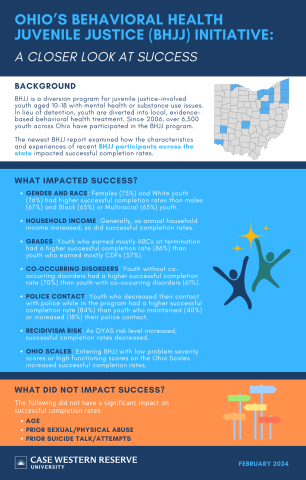Funding Agencies: Ohio Department of Youth Services, Ohio Department of Mental Health and Addiction Services
The majority of juvenile justice-involved youth have a history of behavioral health (mental health or substance use) problems and have experienced a great deal of trauma. However, local jurisdictions are often ill-equipped to accurately assess youth for behavioral health problems and provide appropriate treatment. Ohio’s Behavioral Health/Juvenile Justice (BHJJ) Initiative was intended to transform and expand the local systems’ options to better serve these youths.
Ohio’s Behavioral Health/Juvenile Justice (BHJJ) Initiative is a diversion program for juvenile justice-involved youth between the ages of 10-18 who also suffer from mental or behavioral health issues. In lieu of detention, the BHJJ program diverts youth into more comprehensive, community-based behavioral health treatment. The Begun Center provides research and evaluation support for the initiative and recently released a new report for the initiative.
Statewide BJHH Evaluation Reports 2024
Statewide BHJJ Evaluation Executive Summary 2024
Statewide BHJJ Evaluation Infographic 2024
Materials for BHJJ Sites
In 2024, BHJJ sites implemented electronic data collection procedures to enhance efficiency and improve the quality of the data used in program evaluation. These updated procedures include two components:
1. Access Database: Designed to manage and organize administrative data.
2. iPad Surveys: Used to collect valuable feedback from youth, caregivers, and workers involved in BHJJ programs.
To support the implementation of these tools, user guides, training videos, and additional resources are available in the folders below:
iPad Survey Materials (includes printable surveys)
Research Team: Jeff Kretschmar (Principal Investigator), Ashley Bukach (Research Associate), Satabdi Samtani (Senior Research Associate)


